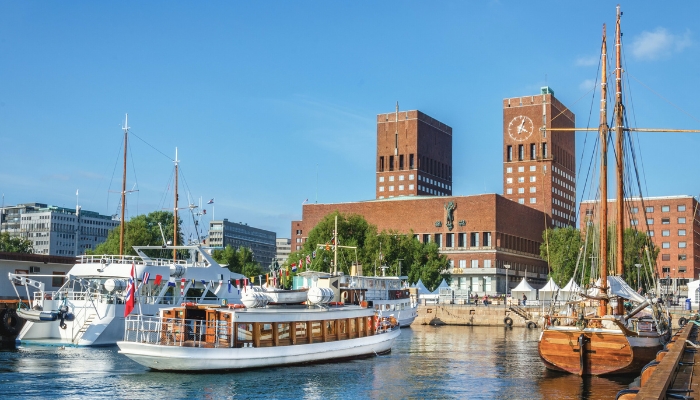Travel
How Oslo’s Honest Ad Redefined Travel Marketing

- Oslo’s tourism board’s viral ad uses humor and honesty to showcase the city’s understated charm, resonating with travelers seeking authenticity over typical tourist experiences.
- The campaign reflects a growing trend in travel marketing, where travelers prefer genuine, relatable experiences rather than idealized portrayals of destinations.
- The success of the ad could lead to a shift in tourism strategies, emphasizing sustainable tourism and attracting a new demographic of eco-conscious travelers.
In a travel sector characterized by glossy, aspirational commercials, Oslo‘s latest tourism campaign has wowed the world with its refreshingly honest and hilarious tone. The film, which stars a deadpan local guide named Halfdan, has gone viral, catching the attention of millions and prompting a debate about what modern travelers genuinely want.
The Viral Success of Oslo’s Tourism Campaign
Oslo’s tourism board has struck gold with a campaign that challenges established marketing methods. Instead of highlighting the city’s most recognisable monuments or thriving nightlife, the advertisement emphasizes what may be considered as Oslo’s weaknesses. Halfdan, the protagonist, leads viewers through the city with a somewhat unimpressed demeanor, highlighting its absence of crowds, abundance of green areas, and overall laid-back ambiance. What was the result? A video that has struck a chord with travelers dissatisfied of the planned, picture-perfect destinations frequently depicted in travel marketing.
Since its premiere, the ad has received approximately 20 million views, demonstrating its widespread appeal. The campaign’s success stems from its ability to capitalize on a growing trend among travelers: a preference for authenticity and real experiences over classic tourist traps.
Why Oslo’s campaign works: the power of authenticity and humor.
The success of Oslo’s advertisement can be attributed to its realism and humor, both of which resonate powerfully with today’s travelers. As individuals get disillusioned with exaggerated descriptions of locations, they gravitate towards areas that provide a more relevant and honest experience. Oslo’s ad does exactly that, portraying the city as it is: unpolished, unpretentious, and authentic.
The ad’s appeal relies heavily on humor. Halfdan’s deadpan style adds a depth of complexity and wit to his criticism, making it more engaging and memorable. This approach not only entertains but also fosters trust by positioning Oslo as a city that isn’t pretending to be something it isn’t.
Shifting Traveler Preferences: Authenticity Over Aspirational Experiences.
The success of Oslo’s anti-ad campaign reflects a substantial shift in traveler preferences. Tourists are no longer drawn only to gorgeous beaches and towering skyscrapers. Today’s travelers are more picky, looking for locations that share their values and provide opportunity for personal development and authentic experiences.
Oslo’s campaign appeals to this sentiment by depicting a city that does not require continual stimulation or costly attractions. Instead, it provides a peaceful, calm setting in which visitors can unwind and reconnect with themselves. This strategy represents a significant shift from the conventional concentration on elegance and excitement, ushering in a new era in travel marketing.
Implications for the Travel Industry: Promoting Honesty and Relatability
The viral success of Oslo’s tourism advertisement has far-reaching repercussions for the whole travel sector. It implies that a more honest, less polished marketing approach may be the key to gaining the attention of today’s travelers. Brands may need to reconsider their strategy, shifting away from producing aspirational fantasies and towards conveying authentic stories that connect on a deeper level.
Furthermore, the campaign emphasizes the value of relatability in marketing. By addressing its apparent imperfections, Oslo has positioned itself as a destination that is both authentic and approachable—qualities that are increasingly crucial to travelers seeking meaningful experiences.
The Importance of Social Media in Spreading Oslo’s Message
Social media was critical to the success of Oslo’s campaign, serving as a powerful amplifier that expanded the ad’s reach far beyond traditional advertising platforms. TikTok, Instagram, and Twitter, which thrive on authentic, relatable material, were ideal platforms for the ad’s distribution. The campaign’s rapid growth on social media highlights the relevance of these platforms in modern marketing, especially for targeting a younger, more sophisticated audience.
User-generated content (UGC) contributed significantly to the campaign’s success. As viewers watched the advertisement, they began to share their own Oslo experiences, causing a ripple effect that improved the city’s image even more. For tourism boards, this demonstrates UGC’s potential as a significant tool for developing a destination’s brand.
Conclusion: Oslo’s anti-ad campaign as a catalyst for change.
Oslo’s viral tourism campaign has set a new standard for travel marketing, emphasizing the importance of authenticity and humor in engaging with today’s travelers. As the travel business evolves, the popularity of Oslo’s anti-ad reminds us that sometimes the greatest way to market a destination is to simply be yourself. By adopting this approach, cities and brands can create a more sustainable and happy future for both travelers and destinations.



















































